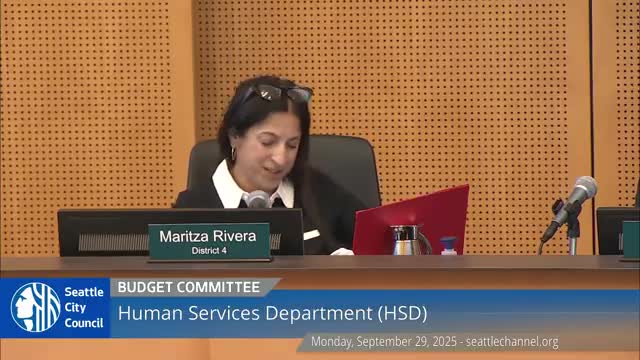Seattle Council Allocates $2.8M for Recovery Program Expansion and Treatment Facilities
September 30, 2025 | Seattle, King County, Washington
This article was created by AI summarizing key points discussed. AI makes mistakes, so for full details and context, please refer to the video of the full meeting. Please report any errors so we can fix them. Report an error »

The Seattle City Select Budget Committee convened on September 29, 2025, to discuss critical budgetary matters, particularly focusing on public safety and health services. The meeting highlighted the importance of oversight in contract management and the need for accountability in city-funded programs.
Council members expressed concerns about the effectiveness of existing contracts, particularly in relation to the LEED program and its outreach efforts. There was a consensus on the necessity for clear outcomes and accountability as the city expands its services. Council member Rivera emphasized the importance of understanding the challenges that come with program expansion, urging for a thorough evaluation of past reports to ensure that successful initiatives do not falter as they grow.
A significant point of discussion was the funding for recovery programs. Council member Nelson celebrated the increase in funding for a pilot program aimed at directing individuals to residential treatment, which has expanded from $300,000 to $2.8 million. This funding is intended to enhance detox services and support a variety of treatment providers. Additionally, the committee discussed the allocation of $1.8 million to the Seattle Indian Health Board's Thunderbird Treatment Center, a priority for several council members.
However, the meeting also addressed concerns regarding the growth of the Human Services Department's budget, which has increased by 72% over the past five years, while the city's population grew by only 10%. This discrepancy raised questions about whether the increased funding has translated into improved outcomes for the community. Council members stressed the need for measurable results from the $292 million allocated to 115 contracts with service providers.
In conclusion, the committee's discussions underscored the ongoing challenges of managing public funds effectively while striving to improve community health and safety outcomes. The next steps will involve further analysis of contract performance and a commitment to ensuring that investments yield tangible benefits for Seattle residents.
Council members expressed concerns about the effectiveness of existing contracts, particularly in relation to the LEED program and its outreach efforts. There was a consensus on the necessity for clear outcomes and accountability as the city expands its services. Council member Rivera emphasized the importance of understanding the challenges that come with program expansion, urging for a thorough evaluation of past reports to ensure that successful initiatives do not falter as they grow.
A significant point of discussion was the funding for recovery programs. Council member Nelson celebrated the increase in funding for a pilot program aimed at directing individuals to residential treatment, which has expanded from $300,000 to $2.8 million. This funding is intended to enhance detox services and support a variety of treatment providers. Additionally, the committee discussed the allocation of $1.8 million to the Seattle Indian Health Board's Thunderbird Treatment Center, a priority for several council members.
However, the meeting also addressed concerns regarding the growth of the Human Services Department's budget, which has increased by 72% over the past five years, while the city's population grew by only 10%. This discrepancy raised questions about whether the increased funding has translated into improved outcomes for the community. Council members stressed the need for measurable results from the $292 million allocated to 115 contracts with service providers.
In conclusion, the committee's discussions underscored the ongoing challenges of managing public funds effectively while striving to improve community health and safety outcomes. The next steps will involve further analysis of contract performance and a commitment to ensuring that investments yield tangible benefits for Seattle residents.
View full meeting
This article is based on a recent meeting—watch the full video and explore the complete transcript for deeper insights into the discussion.
View full meeting
